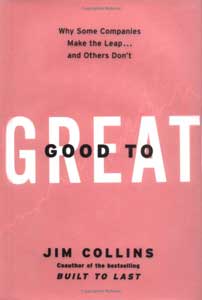By David George Moore
 Valuable truth can certainly be found in a myriad of sources, including those operating outside of a distinctly Christian worldview. To be sure, one needs to be discerning, but there is much one can learn from a wide variety of people.
Valuable truth can certainly be found in a myriad of sources, including those operating outside of a distinctly Christian worldview. To be sure, one needs to be discerning, but there is much one can learn from a wide variety of people.
Reading good literature, history, and philosophy helps us more honestly evaluate our own assumptions and beliefs. Popular books that "everyone is reading" should be carefully selected, but some are worthy of the Christian's attention. Good to Great by Jim Collins is arguably one of those books.
One weakness with Good to Great is the failure to address the "why questions." This is also a prevalent problem in the business community. Too many businessmen seem primarily interested in what they should do and how to best execute the plans. "Why questions" can be challenging and lead to inconvenient answers.
In Good to Great we find all kinds of insight on how a company can move from being "good" to being "great." Notwithstanding the problem of defining "greatness" simply as increased profitability (something Collins fights against to some degree), we need to ask, "Why is it worth it to push ourselves so hard to excel?" Consider this revealing quote by Collins on striving constantly for improvement:
Any journey from good to great requires relentlessly adhering to these input variables, rigorously tracking your trajectory on the output variables, and then driving yourself to even higher levels of performance and impact. No matter how much you have achieved, you will always be merely goodrelative to what you can become. Greatness is an inherently dynamic process, not an end point. The moment you think of yourself as great your slide toward mediocrity will have already begun (Good to Great and the Social Sectors, p. 9, emphasis in the original).
There certainly is an important truth here. Self-satisfaction can lead to mediocrity, passivity, and an overall lack of excellence. Though this risk remains, wisdom dictates we probe this issue further.
Greater commitment to work means fewer hours available for other areas of life. I imagine Collins might retort that he is not necessarily advocating longer hours at work, but "better" or more efficient hours. "Getting the right people on the bus," as Collins likes to say, makes one more effective not necessarily busier. That may be the case, but the description of "driving yourself to even higher levels of performance" seems to entail a greater amount of time devoted to work. Furthermore, in speaking of the "Level 5" leaders who are humble and committed to the company's good, Collins offers this description: "Level 5 leaders are fanatically driven, infected with an incurable need to produce results. They will sell their mills or fire their brother, if that's what it takes to make the company great" (Good to Great, p. 30, emphasis in the original).
I would argue that these humble "Level 5" leaders who are "fanatically driven" actually pose more of a danger than the stereotypical CEOs like Lee Iacocca, Jack Welch, et al. Though the Iacoccas and Welches can be difficult to work with, the shortcomings of megalomaniacs are quickly apparent. On the other side of things, the workaholism of a self-effacing CEO who seems mainly interested in the company's viability can be quite seductive.
One final matter needs to be considered, namely that contentment has been understood since ancient times as a mark of "greatness." The Stoic and Christian traditions both underscore the value of contentment. Constantly striving toward bigger and more grandiose goals need not be the only definition of greatness. Christians can offer wise guidance on this issue, unless of course they themselves are being co-opted by an inadequate definition of greatness.
Again, Jim Collins says some important things. I do wonder if his mountain climbing prowess has clouded his judgment (no pun intended) on always pushing for further excellence in business. Shooting to go from "good" to "great" should never exclude wrestling through the salient "why questions." We may want to climb a mountain simply "because it is there," but that is not a wise approach in business . . . or in the church.
It is unfortunate to see pastors and church leaders indiscriminately accept all the principles of Good to Great. One elder of a large, evangelical church told me that Good to Great was, after his Bible, "the best book I've ever read." Wise church leadersshould read widely and glean from what is good, but always with a keen eye to where truth ultimately resides.




